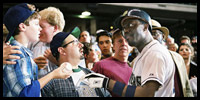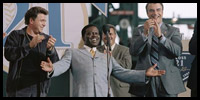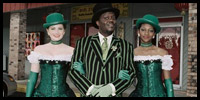
 |
|
Mr. 3000 (2004) Cast: Bernie Mac, Angela Bassett, Michael Rispoli, Chris Noth, Brian J. White, Evan Jones, Ian Anthony Dale, Paul Sorvino, Earl Billings, Tom Arnold, Jay Leno, Carmen Electra, Larry King, Ron Darling, Tony Kornheiser, John Salley, Stuart Scott, Michael Wilbon, Chris Rose, Peter Gammons 2004 – 104 minutes Rated: Reviewed by Dustin Putman, September 18, 2004.  "Mr. 3000," underwhelmingly directed by Charles Stone III (2002's "Drumline"), is being released the same weekend as another sports film, the tennis-themed "Wimbledon." That picture, also lightly comedic and featuring a strong romantic side, resorted to formulaic storytelling so often that it failed to find an identity of its own. The baseball-centered "Mr. 3000," showcasing the passable talents of Bernie Mac (2003's "Bad Santa"), doesn't strike quite as many obvious cliches, but it has even less substance than "Wimbledon." In fact, when "Mr. 3000" finishes up its quick-seeming, inconsequential 104-minute run, it would be understandable if its memory has already begun to slip from the viewer's mind.
"Mr. 3000," underwhelmingly directed by Charles Stone III (2002's "Drumline"), is being released the same weekend as another sports film, the tennis-themed "Wimbledon." That picture, also lightly comedic and featuring a strong romantic side, resorted to formulaic storytelling so often that it failed to find an identity of its own. The baseball-centered "Mr. 3000," showcasing the passable talents of Bernie Mac (2003's "Bad Santa"), doesn't strike quite as many obvious cliches, but it has even less substance than "Wimbledon." In fact, when "Mr. 3000" finishes up its quick-seeming, inconsequential 104-minute run, it would be understandable if its memory has already begun to slip from the viewer's mind.
 Nine years ago, bad-tempered Milwaukee Brewers player Stan Ross (Bernie Mac) abruptly retired from the sport immediately after completing his 3000th hit. Now seeking to be added to the Hall of Fame if anyone will agree to it—he was known to make more enemies than friends when he was still considered a star player—Stan is positively rattled to find that a counting error has dropped his hits down to 2997. Preferring increased fame and viewership over actual success, Brewers owner Schiembri (Chris Noth) welcomes out-of-shape 47-year-old Stan back to the team. What seems like an easy proposition soon becomes anything but as Stan learns how rusty he has gotten at his swing. And, as Stan begins to romance his ex, feisty ESPN reporter Mo (Angela Bassett), he experiences an epiphany about how for granted he once took his life and those around him.
Nine years ago, bad-tempered Milwaukee Brewers player Stan Ross (Bernie Mac) abruptly retired from the sport immediately after completing his 3000th hit. Now seeking to be added to the Hall of Fame if anyone will agree to it—he was known to make more enemies than friends when he was still considered a star player—Stan is positively rattled to find that a counting error has dropped his hits down to 2997. Preferring increased fame and viewership over actual success, Brewers owner Schiembri (Chris Noth) welcomes out-of-shape 47-year-old Stan back to the team. What seems like an easy proposition soon becomes anything but as Stan learns how rusty he has gotten at his swing. And, as Stan begins to romance his ex, feisty ESPN reporter Mo (Angela Bassett), he experiences an epiphany about how for granted he once took his life and those around him.
 Akin to a baseball game turned into a feature film, "Mr. 3000" isn't so much bad as it is terminally empty. The plot is banal, there are no true villains to get in Stan's way and so very little conflict is formed, and the trajectory of the story follows a strictly predictable pattern, each baseball sequences followed close behind by a romantic scene. The film has also been deceptively marketed as a rowdy comedy when, in fact, it takes itself mostly serious and actual laugh-generating moments are close to nonexistent. By the time the movie ends, your hands close on thin air; there is nothing of weight nor anything memorable enough to take away from the superfluous experience of viewing it. Watch as Stan goes to the plate and strikes out. Watch as he befriends his initially difficult, younger teammates. Watch as he sweet-talks gal pal Mo. Watch as his game improves. Watch as he and Mo have a disagreement. Watch as the big game arrives. Watch as its plot threads work themselves out. The end. Save for the pivotal climactic moment in which the answer to whether Stan will or will not reach his 3000th hit is revealed, "Mr. 3000" is tediously by-the-books. In that one moment, though, director Charles Stone III offers a fresh, unexpected twist on the norm. It is too mature to deserve the lackluster rest of the picture.
Akin to a baseball game turned into a feature film, "Mr. 3000" isn't so much bad as it is terminally empty. The plot is banal, there are no true villains to get in Stan's way and so very little conflict is formed, and the trajectory of the story follows a strictly predictable pattern, each baseball sequences followed close behind by a romantic scene. The film has also been deceptively marketed as a rowdy comedy when, in fact, it takes itself mostly serious and actual laugh-generating moments are close to nonexistent. By the time the movie ends, your hands close on thin air; there is nothing of weight nor anything memorable enough to take away from the superfluous experience of viewing it. Watch as Stan goes to the plate and strikes out. Watch as he befriends his initially difficult, younger teammates. Watch as he sweet-talks gal pal Mo. Watch as his game improves. Watch as he and Mo have a disagreement. Watch as the big game arrives. Watch as its plot threads work themselves out. The end. Save for the pivotal climactic moment in which the answer to whether Stan will or will not reach his 3000th hit is revealed, "Mr. 3000" is tediously by-the-books. In that one moment, though, director Charles Stone III offers a fresh, unexpected twist on the norm. It is too mature to deserve the lackluster rest of the picture.
 Bernie Mac is faced with the formidable challenge of playing the hero and the anti-hero, since his Stan Ross is stuck-up and self-involved for most of the narrative, and he pulls it off. His character isn't developed enough to warrant much sympathy, and Mac gets precious little of interest to say and do, but he does handle some of the quieter moments of redemptive realization with believability. As the doubting Mo, Angela Bassett (2001's "The Score") gives it a go at invigorating her shopworn romance with Stan, but she is too accomplished of an actress to be saddled with playing the stock love interest. The rest of the characters are one-dimensional even by the standards of a conventional baseball flick, none of them given much of an arc and the majority of them disappearing for inordinately long stretches.
Bernie Mac is faced with the formidable challenge of playing the hero and the anti-hero, since his Stan Ross is stuck-up and self-involved for most of the narrative, and he pulls it off. His character isn't developed enough to warrant much sympathy, and Mac gets precious little of interest to say and do, but he does handle some of the quieter moments of redemptive realization with believability. As the doubting Mo, Angela Bassett (2001's "The Score") gives it a go at invigorating her shopworn romance with Stan, but she is too accomplished of an actress to be saddled with playing the stock love interest. The rest of the characters are one-dimensional even by the standards of a conventional baseball flick, none of them given much of an arc and the majority of them disappearing for inordinately long stretches.
 Without an assured funny streak or a tightly developed catharsis for Stan Ross to go through, "Mr. 3000" is useless. Director Charles Stone III and his three screenwriters (Eric Champnella, Keith Mitchell, and Howard Gould) seem to be at a loss to what kind of film they want to make—light comedy, ruminative drama, or heartfelt romance—and the spare parts of each genre mesh jarringly together. What is left , then, is trivial fare just a little confusing as to what demographic it is targeting; kids will be bored, while adults will have seen it all done before, and better. There is nothing overtly terrible about "Mr. 3000," but there is also a collective lack of rooting involvement that cannot be denied. Mercifully, its dullness is alleviated by ending quickly and not wearing out its welcome to an unbearable degree. One should always look on the bright side, but some may not be so forgiving after having wasted their time.
Without an assured funny streak or a tightly developed catharsis for Stan Ross to go through, "Mr. 3000" is useless. Director Charles Stone III and his three screenwriters (Eric Champnella, Keith Mitchell, and Howard Gould) seem to be at a loss to what kind of film they want to make—light comedy, ruminative drama, or heartfelt romance—and the spare parts of each genre mesh jarringly together. What is left , then, is trivial fare just a little confusing as to what demographic it is targeting; kids will be bored, while adults will have seen it all done before, and better. There is nothing overtly terrible about "Mr. 3000," but there is also a collective lack of rooting involvement that cannot be denied. Mercifully, its dullness is alleviated by ending quickly and not wearing out its welcome to an unbearable degree. One should always look on the bright side, but some may not be so forgiving after having wasted their time.
|
© 2004 by Dustin Putman |














